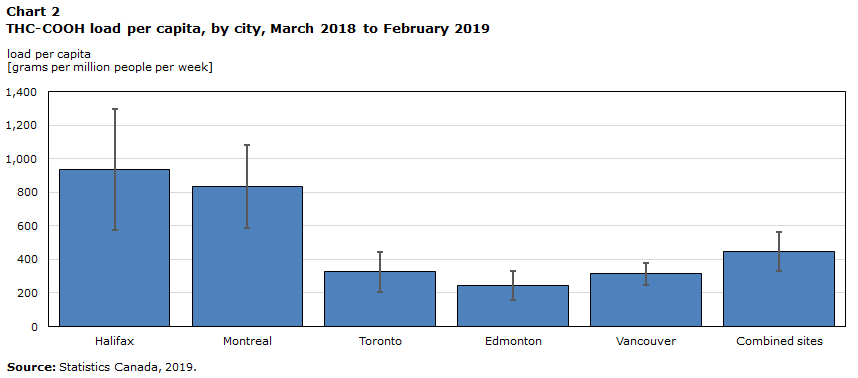Cannabis Bashful? Acquisition from Illegal Sources?
"Over the past two years, Statistics Canada has been working to update its statistical programs to better capture the social and economic impacts related to the legalization of cannabis, which took place on October 17, 2018, and to the misuse of opioids and other drugs with higher risk of being abused. Accurate measures of total societal use of cannabis and misused drugs are difficult to obtain." "The stigma associated with use and reluctance to disclose purchases from non-regulated suppliers are two factors that could contribute to some under-reporting on surveys. To support the survey-based data, Statistics Canada is exploring the use of a technique called wastewater-based epidemiology (WBE), which has been used in Europe since 2007 to report on the consumption of different types of drugs in large cities (European Monitoring Centre for Drugs and Drug Addiction, 2016).""In March 2018, the agency implemented a pilot project to collect and test municipal wastewater samples for traces of cannabis, and a dozen other drugs to examine if the resulting data could be used to make estimates of the extent of drug use in different cities across Canada and change in use over time. The pilot test is the largest ever conducted in North America in terms of population covered. The advantages of this technique include its low cost, timeliness, the ability to monitor change over time at the city level, and importantly, the potential to determine the total amount of a drug consumed, whether legally or illegally acquired. One limitation of this approach is that it does not provide information on the number or characteristics of individuals who consumed or how the drugs were consumed, but Statistics Canada uses other surveys to help determine these more detailed data."
"The pilot project covered 14 wastewater treatment plants in five large urban centres across the country, and serving close to 8.4 million people, which is over 20% of the Canadian population (Table 1). Wastewater from each site was sampled at least every 30 minutes for seven consecutive days starting on the second Monday of each month, from March 2018 to February 2019."
"It is possible that the consumption per user could be greater. It is also possible that cannabis use in Montreal is measurably higher than for the rest of Quebec."
Statistics Canada, Wastewater report
Wastewater samples have been collected from five cities in Canada to search for traces of cannabis in an effort to gauge the actual use of the drug through collecting, and testing the evidence in wastewater. The results were found to be somewhat unexpected; on the one hand they were the opposite of other data collected by Statistics Canada on pot use. On the other hand, it became clear that the size of the black market access to drugs appeared to be higher than anticipated.
Wastewater Pilot-Test Design Table summary
This table displays the results of Wastewater Pilot-Test Design. The information is grouped by Test Site (appearing as row headers), Wastewater Treatment Plants and 2018 Population
(millions of people) (appearing as column headers).Test Site Wastewater Treatment Plants 2018 Population
(millions of people)Central Halifax 3 0.2 Montreal Island 1 2.0 Toronto City 4 2.8 Edmonton City 1 1.0 Vancouver metro area 5 2.5 Total 14 8.4 Source: Statistics Canada 2019
The human body converts THC into THC-COOH, when cannabis is consumed. The resulting chemical can be measured in wastewater, otherwise known as sewage. Halifax, as it turned out, had the highest average load of THC-COOH per capita of the five cities that were measured between March 2018 and February 2019. Then came Montreal, followed by Toronto, Vancouver and Edmonton.
 |
Statisticians were not surprised to find that residents of Halifax excrete more cannabis residue than users of any other Canadian city, given that the National Cannabis Survey associated with Statistics Canada found 24 percent of Nova Scotians self-reported the use of pot in the second quarter, representing the highest use of any province.
What was unexpected however, is the high level of the chemical residue in Montreal's wastewater since a mere ten percent of Quebecers felt free to report cannabis use in the second quarter, representing the lowest score of any province. The low wastewater results for Edmonton also appear perplexing, since Alberta had the third-highest reported cannabis use at 20 percent.
This inexact science of having people self-report is obviously behind the failure of people's admissions of use not matching the actual tested samples in the various cities' wastewater pools. It would seem that, factors beyond simple cannabis use per capita could be skewing the results, allowing for the fact that people are notoriously reluctant to divulge their use of a mind-altering drug which, though now legal, still has a social stigma attached to its devoted use.

Labels: Cannabis, Statistics Canada, Study


0 Comments:
Post a Comment
<< Home